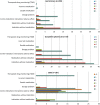Medication in older patients reviewed multiple ways (MORE) study
- PMID: 31302885
- PMCID: PMC6800858
- DOI: 10.1007/s11096-019-00879-3
Medication in older patients reviewed multiple ways (MORE) study
Abstract
Background Polypharmacy in older patients can lead to potentially inappropriate prescribing. The risk of the latter calls for effective medication review to ensure proper medication usage and safety. Objective Provide insight on the similarities and differences of medication review done in multiple ways that may lead to future possibilities to optimize medication review. Setting This study was conducted in Zuyderland Medical Centre, the second largest teaching hospital in the Netherlands. Method This descriptive study compares the quantity and content of remarks identified by medication review performed by a geriatrician, outpatient pharmacist, and Clinical Decision Support System. The content of remarks is categorized in seven categories of possible pharmacotherapeutic problems: 'indication without medication', 'medication without indication', 'contra-indication/interaction/side-effect', 'dosage problem', 'double medication', 'incorrect medication' and 'therapeutic drug monitoring'. Main outcome measure Number and content of remarks on medication review. Results The Clinical Decision Support System (1.8 ± 0.8 vs. 0.9 ± 0.9, p < 0.001) and outpatient pharmacist (1.8 ± 0.8 vs. 0.9 ± 0.9, p = 0.045) both noted remarks in significantly more categories than the geriatricians. The Clinical Decision Support System provided more remarks on 'double medication', 'dosage problem' and 'contraindication/interaction/side effects' than the geriatrician (p < 0.050), while the geriatrician did on 'medication without indication' (p < 0.001). The Clinical Decision Support System noted significantly more remarks on 'contraindication/interaction/side effects' and 'therapeutic drug monitoring' than the outpatient pharmacist, whereas the outpatient pharmacist reported more on 'indication without medication' and 'medication without indication' than the Clinical Decision Support System (p ≤ 0.007). Conclusion Medication review performed by a geriatrician, outpatient pharmacist, and Clinical Decision Support System provides different insights and should be combined to create a more comprehensive report on medication profiles.
Keywords: Clinical Decision Support System; Elderly; Medication review; Netherlands; Potentially inappropriate prescribing.
Conflict of interest statement
All authors declare that they have no conflicts of interest.
Figures
Similar articles
-
Evaluation of pharmacist interventions and commonly used medications in the geriatric ward of a teaching hospital in Turkey: a retrospective study.Clin Interv Aging. 2019 Mar 21;14:587-600. doi: 10.2147/CIA.S201039. eCollection 2019. Clin Interv Aging. 2019. PMID: 30962679 Free PMC article.
-
Cooperation between geriatricians and general practitioners for improved pharmacotherapy in home-dwelling elderly people receiving polypharmacy - the COOP Study: study protocol for a cluster randomised controlled trial.Trials. 2017 Apr 4;18(1):158. doi: 10.1186/s13063-017-1900-0. Trials. 2017. PMID: 28372591 Free PMC article. Clinical Trial.
-
Clinical medication reviews in elderly patients with polypharmacy: a cross-sectional study on drug-related problems in the Netherlands.Int J Clin Pharm. 2016 Feb;38(1):46-53. doi: 10.1007/s11096-015-0199-8. Epub 2015 Nov 23. Int J Clin Pharm. 2016. PMID: 26597955 Free PMC article.
-
Pharmacist-led medication review in community settings: An overview of systematic reviews.Res Social Adm Pharm. 2017 Jul-Aug;13(4):661-685. doi: 10.1016/j.sapharm.2016.08.005. Epub 2016 Aug 28. Res Social Adm Pharm. 2017. PMID: 27665364 Review.
-
Electronic prescribing and other forms of technology to reduce inappropriate medication use and polypharmacy in older people: a review of current evidence.Clin Geriatr Med. 2012 May;28(2):301-22. doi: 10.1016/j.cger.2012.01.009. Clin Geriatr Med. 2012. PMID: 22500545 Review.
Cited by
-
Evaluation of Diagnostic Recommendations Embedded in Medication Alerts: Prospective Single-Arm Interventional Study.J Med Internet Res. 2025 May 27;27:e70731. doi: 10.2196/70731. J Med Internet Res. 2025. PMID: 40424063 Free PMC article.
-
Torsade de pointes in an older patient with Takotsubo cardiomyopathy caused by licorice-induced pseudoaldosteronism: A case report.Clin Case Rep. 2022 Jul 19;10(7):e6104. doi: 10.1002/ccr3.6104. eCollection 2022 Jul. Clin Case Rep. 2022. PMID: 35865783 Free PMC article.
-
Sedatives and analgesics are major contributors to potentially inappropriate duplicate prescriptions in geriatric psychiatry.Psychogeriatrics. 2023 Mar;23(2):354-363. doi: 10.1111/psyg.12940. Epub 2023 Jan 31. Psychogeriatrics. 2023. PMID: 36720843 Free PMC article.
-
Potentially inappropriate medications according to PRISCUS list and FORTA (Fit fOR The Aged) classification in geriatric psychiatry: a cross-sectional study.J Neural Transm (Vienna). 2022 Nov;129(11):1367-1375. doi: 10.1007/s00702-022-02541-1. Epub 2022 Sep 2. J Neural Transm (Vienna). 2022. PMID: 36050603 Free PMC article.
-
What do older patients know about their medication? A cross-sectional, interview-based pilot study.Eur J Clin Pharmacol. 2023 Oct;79(10):1365-1374. doi: 10.1007/s00228-023-03548-7. Epub 2023 Aug 10. Eur J Clin Pharmacol. 2023. PMID: 37561156 Free PMC article.
References
-
- Gruneir A, Silver M, Rochon PA. Emergency department use by older adults: a literature review on trends, appropriateness, and consequences of unmet health care needs. Med Care Res Rev. 2011;68:131–155. - PubMed
-
- Roberts DC, McKay MP, Shaffer A. Increasing rates of emergency department visits for elderly patients in the United States, 1993 to 2003. Ann Emerg Med. 2008;51(6):769–774. - PubMed
-
- Salvi F, Morichi V, Grilli A, Giorgi R, De Tommaso G, Dessi-Fulgheri P. The elderly in the emergency department: a critical review of problems and solutions. Intern Emerg Med. 2007;2(4):292–301. - PubMed
-
- Strange GR, Chen E. Use of emergency departments by elder patients: a five-year follow-up study. Acad Emerg Med. 1998;5:1157–1163. - PubMed
MeSH terms
LinkOut - more resources
Full Text Sources


